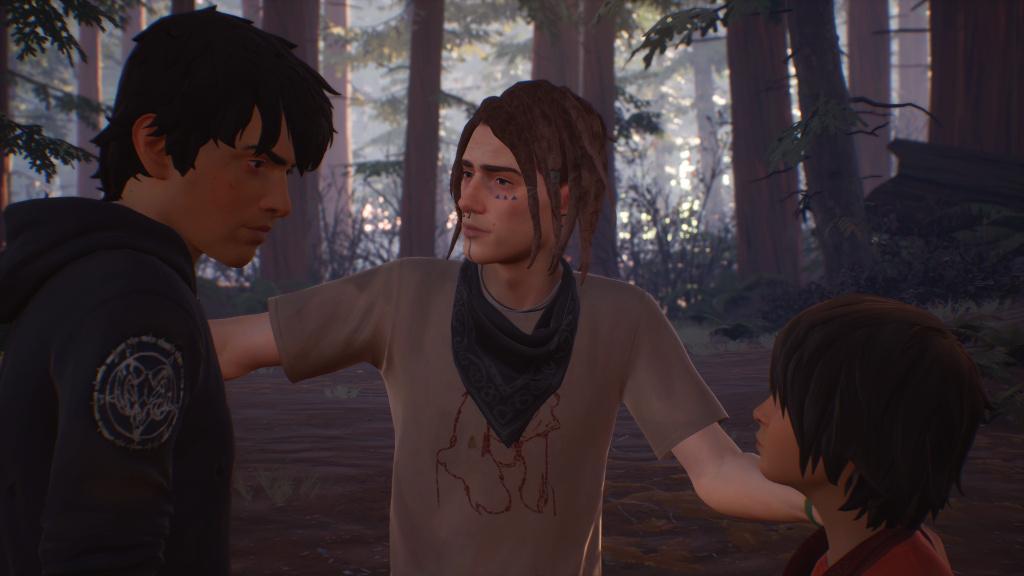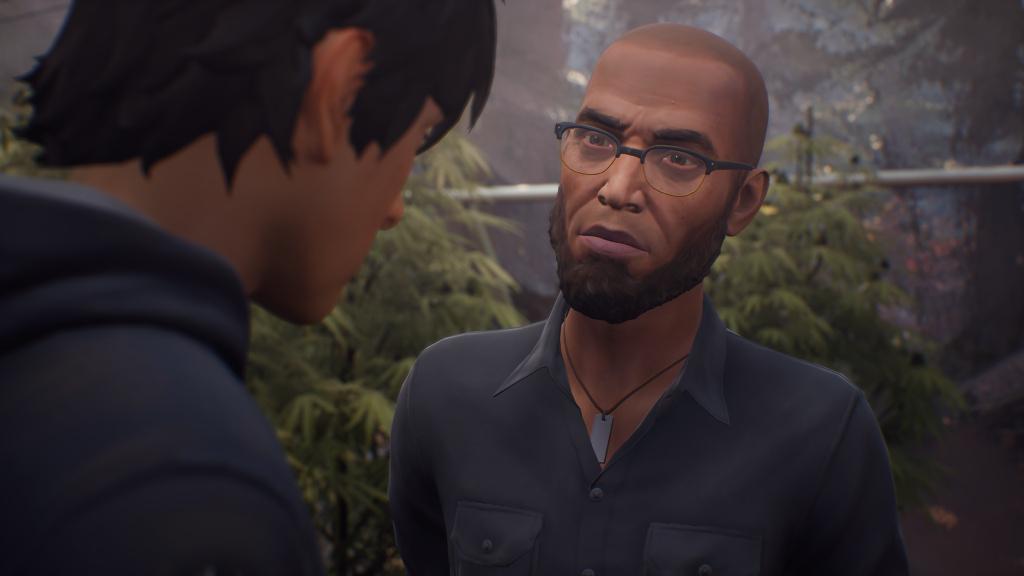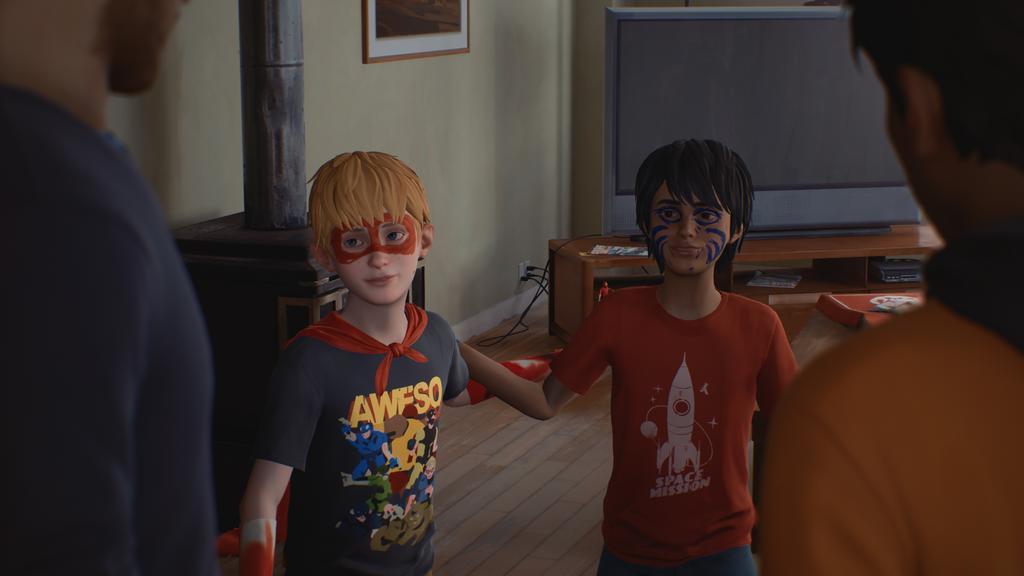Developer Dontnod's narrative Life is Strange games have come to occupy a specific niche on the video game industry landscape. Life is Strange and Life is Strange 2 tell stories about coming of age and growing up that focus on player choices. While both seasons of the series also include kids with fantastic supernatural powers, the games primarily try to discuss subjects that are relatable to everyday life. Life is Strange 2 is particularly interesting for its setting in the current US political climate, taking place right before the 2016 presidential election and including a lot of the issues and rhetoric surrounding it.
Life is Strange 2 director Raoul Barbet and lead writer Jean-Luc Cano took part in a panel at San Diego Comic-Con 2019, where they discussed some of the ins and outs of working on the Life is Strange franchise and creating the young characters who make up its world. Ahead of the panel, Barbet and Cano sat down with GameSpot to talk about the burgeoning Life is Strange "universe," which now spans Life is Strange, its prequel Before the Storm, Life is Strange 2, and The Adventures of Captain Spirit, a free episode that functions as an add-on story for Life is Strange 2.
While the franchise seems to be expanding to include a variety of different stories, neither Barbet and Cano were sure where the franchise might be headed after the conclusion of Life is Strange 2's last two episodes, the next of which is due out in August. Regardless of whether Life is Strange continues, though, the formula of narrative game it embodies is something both developers said Dontnod will pursue.

GameSpot: As you think about the Life is Strange "universe," what is it that makes a Life is Strange game?
Raoul Barbet: As you may know it's Square Enix, the publisher, that owns the brand of Life is Strange. So after the first Life is Strange, we were discussing with them if they were interested in creating a new season. That was the case and we were asking ourselves what really was the DNA of those games, and those style of games. So for the first Life is Strange, we didn't want to create, like, a universe or something like that, it was more about creating a game--a good game, I hope. And even after the first episode, we didn't know if we'd continue to create the other episodes. We were in luck because it works quite well and we were happy, so we were able to finish the first season and create the new one.
So I'd say that because it was really an independent game and a full story that works by itself, we wanted to do the same thing with Life is Strange 2, so it's a new story, new characters, but of course, the DNA of the game is still there. So it'll be the artistic direction, it will be that we want to create, first, believable characters and a good story, and that tackles some actual subjects of society's problems and that kind of stuff, and puts the player in some interesting situations. And in the end, you've got the supernatural element, so in the first season, it was the ability to rewind, linked to the story of Max and the coming of age story. And this one involves Daniel and the education subject, and the fact we wanted to talk about, what does it take to educate someone and take care of someone else?
What are you guys thinking about as this world keeps getting bigger, and what do you want to do with it?
Jean-Luc Cano: We don't really know if we're going to do another Life is Strange game, but with Captain Spirit, Life is Strange 2 was already written, and we were thinking about how to present it to the players, to the community, to the fans, the new flavor of Life is Strange 2. That's why we made Captain Spirit, to introduce in a smart way Sean and Daniel, not by making them the heroes of Captain Spirit, but by making them the guests at the end. When you see Sean and Daniel at the end, nobody knew that they would be the heroes of the new season. Then we released the first trailer for Life is Strange 2, people were like, oh man, it's the two guys from the end of Captain Spirit.
For the future, we don't know if we're going to make Life is Strange 3 or expand the universe. We haven't been thinking about it in this kind of way. Actually, we're working on Episode 4 and Episode 5, and we're really dedicated to these last two episodes because it's a lot of work. We don't know what we're going to do next.
Barbet: The fact is that Square Enix owns the brand, so it's their decision to expand the universe. Even if we have created the first season and the characters, and for this one and the characters. They own the brand. So I don't think we're going to continue, but if we continue as creators, game creators, we'll continue to create narrative games like this. And I think Captain Spirit was a great experience for us because it was very different. It's a small game some would say, it's a shorter game, but I think we managed to create very quickly our universe and believable characters, and it was quite a challenge at this time, but we would be able to continue to create small games like this. So it might not be in the Life is Strange universe but we don't know. We're game directors, so we don't know what we'll be working on, and I don't know what Square Enix wants.

As you were focusing on Episode 4 and 5, was the whole story written ahead of time or is it evolving as you're making it?
Cano: The whole story was written from the beginning. So our process is to write and imagine the story with Michelle and Raoul, we three imagine the story, then I write the first big [take on the] story. And then after that, the story's cut into five episodes. We're working from the top, the main story, and then we divide it into sequences, and then from sequences into small scenes, and then from scenes into dialogues. So we know from the beginning where we're going to, but because of the game itself, the episodic approach, we're able to change stuff in production. But basically, the main story is written from the beginning.
Have there been any changes like that, any responses to how maybe how players are experiencing the game or their feedback?
Cano: Yes, the fact that we have four months between two episodes and at the end of every episode we have the statistics, we can shape the experience of the new episode we are in production on. So we've made a few adjustments regarding player choices, and also from a production point of view, sometimes the episode is too big to be done, so we have to cut some sequences. Our job is to say, okay, if we cut all these sequences, what we're saying in these sequences has to be said somewhere else. So we have to reshape the episode from this point of view.
The game is very much set in this specific current political climate. It's reacting to things that are happening in our real world, like with its mention of Donald Trump's wall on the Mexico-US border. That situation is, even now, evolving every day--is what's going on in the real world filtering down to you as you make each new episode, and are you responding to what's happening in our world?
Barbet: I don't think we want to make statements, for sure. It's not the purpose of our game. It's more about putting the players in interesting situations where they can think about all those subjects. The idea is not to make political statements or to say this is good or this is bad, it's more to see the situation, live this moment, and to think about it. ...But I think it's not evolving so much in the beginning of the game, because by the time we had written the story, all those subjects were already there, and I think even like a hundred years ago. It's the same in Europe and in other countries. Our game is taking place in the US so we talk about it here, but in France it's the same. We wanted to talk about those subjects because of the story and the sequences we wanted to create for the players. Like you say, it's evolving very fast, but we're not changing the story for that, I think it was already there from the beginning.

Creating believable kids is a big part of what you're talking about on your panel, and it seems like a big challenge. What's it like trying to build those characters, and what work are you doing maybe from a research perspective?
Barbet: At the beginning, we were doing a lot of research about that, and about education in a general way, books and documentaries about psychologists and sociologists who talk about this. And after that, it's a lot of work with the writers and with the actors. For Daniel, it was a very young child, and the voice actors as well, so we discuss with them. Jean-Luc has a daughter, so there is a lot of his own story inside the story of Life is Strange 2. And after that, we research and talk about the scene with different people to be sure to be accurate. But having a believable young child is really difficult. It's dialogues and sentences, cues, but it's also acting, like in the animation, those little elements that give Daniel believability. It's a lot of small stuff like that during production.
So you're bouncing lines off the actors and asking "Does this feel authentic to you?"
Barbet: Yeah, even when we are shooting a scene, we're asking, "is it believable like this?" and they're saying, "no, it's not really believable to do that," et cetera. And the same for the voice actors, each time we record some lines, as we're French, we prefer to trust American people to tell us it sounds natural or to make sure it's not cliche or the French way of saying things.
All the Life is Strange games, they don't back down from dealing with social issues and things that are real part of kids' lives and of growing up. What kind of issues would you say you're trying to tackle in Episodes Four and Five, thematically?
Cano: To be honest, we can't really talk about what will happen in Episodes Four and Five, but the themes we are tackling in Four and Five are new themes that haven't been seen in the first three episodes of Life is Strange 2, or in the first season of Life is Strange. Sean and Daniel will face new scenes, new characters, new moods. So we really can't wait to see the reaction of the fans and the players and the community, because it's a new subject.
You mentioned that a lot of the story is kind of yours, with your daughter. Can you tell me more about that?
Cano: Yeah, when we were imagining what Life is Strange 2 could be with [co-director] Michel [Koch] and Raoul, I was just figuring out that, as a father, everything I was doing, everything I was saying, my little daughter took it as an example. For example, if I said to her, "You know, it's bad to say bad words," she'd say, "Yes, but when you're driving you say a lot of bad words." Okay, so, yeah, I figured out that everything I was doing or saying, I was an example for her, so I had to behave myself not for me to be a better person, but for her to learn to be a better one.
So I think the beginning, the seed of Life is Strange 2 came from this, and when we imagined the story of Life is Strange 2, I told Michel and Raoul, we could have this thing where you shape a new character by your actions. So the fact would be in LIfe is Strange 2 every decision you make as Sean would have an impact not only on you and your story, but also on Daniel. So as a player it will be really interesting to see, oh my god, Daniel is growing up, but he's becoming a bad kid. But it's only because of me, and what I had done? I thought I was making good decision for him.

Is it tough to balance the idea of consequences for your actions with giving the player a chance to fix things? I know after Episode 2 I was thinking, okay, how can I get Daniel back on track, how can I "win." How do you balance the push and pull of wanting consequences to flow forward with giving the player the ability to try to "fix" things?
Barbet: I would say there's not a good or bad ending, or things to "fix." Because I think it's more, maybe you think you have made a mistake, or you think you could have done better with something that happens every day in your life, you know? You make decisions, you make choices with any of that. But you can't rewind. You can't go back in time. So the idea of this game is: be careful, you will be responsible for some consequences, but you will also be responsible for Daniel's whole life, maybe, because of this education aspect.
So I really think it's strong as a basis for a game. It was really strong. And from a design point of view, I would say we find good moments for the player to be able to choose a bit, but we really, of course, stay on a storyline we have to tell. So you can have very different endings, like you have seen in Episode 2, but we have to go on and continue to tell the story. So we can't, I would say, have too many different scenes and different endings, for example in this episode, because we want to keep the characters believable, and we want the story to continue to work, even if Daniel is changing a lot. So you have to find the right balance between giving some freedom to the players and in the meantime, keep your story safe, or keep your story believable.
Cano: And I think the main difference between the first season of Life is Strange and Life is Strange 2 is that, in the first season of Life is Strange, when you make a decision with Max, you can see the consequence immediately. And you see, two or three sequences later, another consequence, but you knew it was because of this decision.
In Life is Strange 2, you don't see immediately the consequences. You don't have your massive, big decisions. The behavior of Daniel is shaped by a lot of small details you don't notice at the time. Even if we have big, huge A or B choices, Daniel is not always shaped by only these big decision. He is shaped by a lot of little stuff, vital choices, action you've made, picking up some stuff. And it's all separate stuff, you know. So when you say, "Okay, what I've done wrong?" It's not one decision you have made. It's a lot of different small details that shape Daniel, but it's not right or wrong. It's only your experience.

